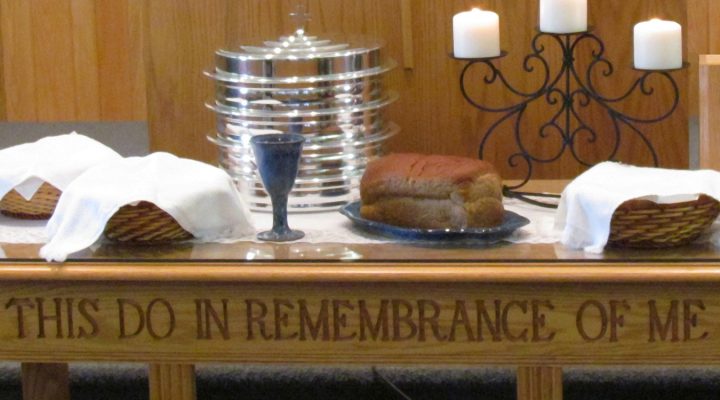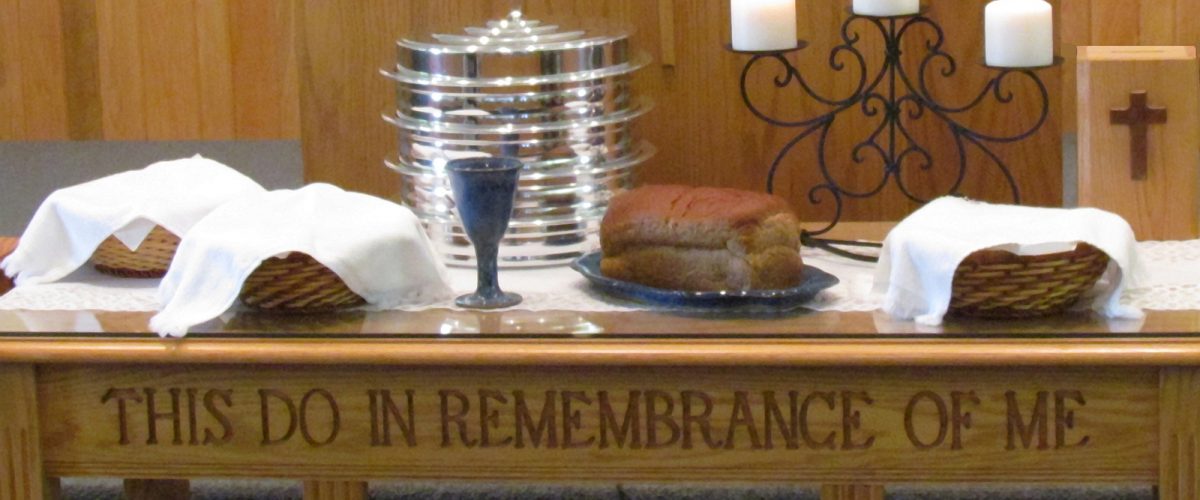As a child I remember my mother, an elder in our Presbyterian church, preparing Communion. I remember going with her to buy bread a few days before so it would not be too soft to cut in little squares and arriving early on those Sunday mornings to watch her fill tiny cups with grape juice. I remember helping her clean up by collecting all the tiny glass cups to load into the dishwasher. I remember feeding the leftover bread squares to the birds.
I even remember one time she let me eat and drink some of the leftovers and I did not practice self-control, which meant a little over an hour later me having a not-so-holy experience of the reappearing of bread and grape juice in the back of our Dodge minivan. I did not partake of the leftovers again after that experience.

Sarah Boberg
I remember the first time I served Communion. I remember the humility and grace I experienced as I looked into the eyes of Jesus followers and remembered around a common table. I remember watching teenagers serve their leaders this sacred meal on youth retreats. I remember the time I served this meal when I felt entirely broken and had nothing to give, sobbing the entire time, hoping tears would not drop into the cup I held for others to dip their bread into. I remember the first time I served Communion with one of my students, standing alongside a shared table, two female ministers.
One Sunday as I sat on the front pew of the church, staring at the silver platters, perfectly stacked on a clean white tablecloth and a loaf of bread pre-sliced for easy tearing, I thought, “Why do we pre-slice the bread?”
Communion is a fascinating practice, practiced differently by various traditions, denominations, churches and faith communities. For me, it always has been a table of wonder and reflection. However, the older I get, the more I have become disconnected from the formal Communion of silver plates and perfectly pressed tablecloths.
I know this sacred meal is a remembrance of Jesus’ last meal with his disciples; however, the practice of our remembrance seems so disconnected from the reality of Jesus’ meal with his disciples.
It was a Passover meal. There was wine. There was reclining. There were lots of “rough-around-the-edges” people gathered. It probably did not smell great. There most likely was nothing perfectly pressed or stark white in the room. It probably was a little unorganized. It probably was loud at times. Most people in the room did not understand what was happening or what was about to happen. Jesus was sharing the bread and cup with people he knew would betray him. This gathering seems different from the somber, quiet, formal meal we often partake in the remembrance of Jesus.
“Jesus does not make things easy, convenient or quick.”
As a minister, I know why we pre-slice the bread. We pre-slice the bread for convenience. We pre-slice the bread for the same reason we prepare the tiny crackers and fill the little cups — so the meal can be served, delivered and partaken smoothly (and quickly). But I must be honest, the reason we pre-slice the bread makes the pre-slicing even more problematic.
Jesus is not convenient. Jesus disrupts and transforms. Jesus does not make things easy, convenient or quick.
I need a Communion that more resembles the Jesus I know in the Gospels — a little rough-around-the-edges, willing to do the hard work and committed to the journey.
I need a Communion that more resembles my life of faith — sometimes unorganized and loud, sometimes even a little smelly (full of dirty laundry and a sink full of dirty dishes), not perfectly stacked or pressed but real and focused on Jesus.
I need a Communion, a sacred meal of fellowship, with the body of Christ — not just the privileged who look like me and who show up at a certain time and place but all people created in God’s image gathered in equity, acceptance and love.
I need a Communion that resembles me. A Communion that may not follow the liturgy perfectly. A Communion that may be awkward at times. A Communion that is not all “put together,” but is present.
I need a Communion that is a reflection of the brokenness and reconciliation of Christ.
As we approach World Communion Sunday, I cannot help but notice the brokenness in our world. I cannot help but notice the brokenness of my own heart and spirit. So, servers of Communion, I ask you to consider not pre-slicing the bread this week.
Let the bread be whole when it comes to the table. Take the time to tear the bread. Hear it crunching in your hands. Let the crumbs fall to the floor. Because on this World Communion Sunday, we need to be reminded of the reality of this sacred meal. For we are a broken people in a broken world, in need of the hope and reconciliation of Christ found in a humble, crowded, and authentic table.
Sarah Boberg serves as assistant professor of Christian education and director of the Empowering Families Grant at Campbell University Divinity School in Buies Creek, N.C. She earned a bachelor’s degree in religion and a master of divinity degree from Campbell, she earned a Ph.D. in educational studies at the University of North Carolina at Greensboro. Her dissertation research focused on the call experiences of Baptist women in ministry.


